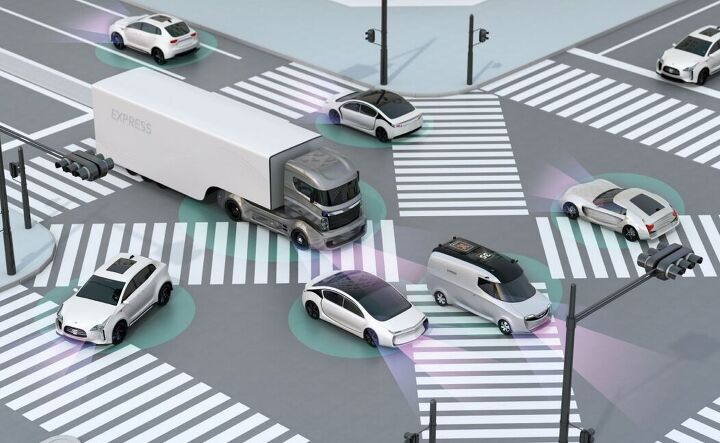NHTSA Deputy Administrator: There's No Need to Regulate Autonomous Cars

Heidi King, deputy administrator of the National Highway Traffic Safety Administration, claims it’s too soon to begin imposing rules on self-driving vehicles. Thus far, the NHTSA as taken a supremely lax posture on handling autonomous vehicles in the hopes that a softer touch will assist in their swift development.
However, a cluster of fatal incidents involving advanced driving technology created fresh paranoia within the government.
While the argument could be made that those accidents demand a response from federal regulators, it’s also clear the government doesn’t have a firm grasp on the technology. Likewise, there’s little consensus among automakers that have only recently begun discussing how these vehicles should be standardized, and loads of conflicting opinions exist on the matter of safety. In the short term, advanced electronic aids allow motorists to become worse at driving. But, if fully autonomous vehicles function as intended, their long-term safety benefits could be immense.
The NHTSA claims the resulting confusion means it’s too early in the process to make any kind of definitive rulings.
“At this point the technology is so nascent I don’t think it is appropriate today to regulate this technology,” King said in an interview with Bloomberg. “It’s not there yet, but each and every day we are open to identifying when the time is right.”
Deciphering when the right time will be is going to be difficult, however. While automakers are likely appreciative of the agency’s hands-off approach, the industry won’t be pleased if the technology is allowed to progress unimpeded for years, then halted by new regulatory measures nobody saw coming.
As certain safety advocacy groups seek new rules, King said NHTSA is focused on dismantling old ones that could impede autonomous technology’s current progression. This year, the agency issued a request for comment from the industry to identify problematic vehicle standards while simultaneously holding roundtable talks to gain a clearer picture of where development is heading.
“In the grand scheme of things in saving lives, impaired drivers and flawed human choices are still the big problems we need to solve as a nation,” King said.
The NHTSA has held the assumption that self-driving cars will ultimately reduce the number of roadway fatalities. But we’ve seen an increase in life-ending accidents since advanced driving technologies became more prevalent. Data from the agency showed fatalities increasing by 10 percent in 2015 and 5.2 percent in 2016.
Figures from last year are inconclusive, but estimates from the National Safety Council claim little to no change. It accused distracted driving and higher speed limits as the primary culprits for the worsening situation and theorized that advanced driving aids may have helped offset the danger.
[Image: NHTSA]

A staunch consumer advocate tracking industry trends and regulation. Before joining TTAC, Matt spent a decade working for marketing and research firms based in NYC. Clients included several of the world’s largest automakers, global tire brands, and aftermarket part suppliers. Dissatisfied with the corporate world and resentful of having to wear suits everyday, he pivoted to writing about cars. Since then, that man has become an ardent supporter of the right-to-repair movement, been interviewed on the auto industry by national radio broadcasts, driven more rental cars than anyone ever should, participated in amateur rallying events, and received the requisite minimum training as sanctioned by the SCCA. Handy with a wrench, Matt grew up surrounded by Detroit auto workers and managed to get a pizza delivery job before he was legally eligible. He later found himself driving box trucks through Manhattan, guaranteeing future sympathy for actual truckers. He continues to conduct research pertaining to the automotive sector as an independent contractor and has since moved back to his native Michigan, closer to where the cars are born. A contrarian, Matt claims to prefer understeer — stating that front and all-wheel drive vehicles cater best to his driving style.
More by Matt Posky
Latest Car Reviews
Read moreLatest Product Reviews
Read moreRecent Comments
- Bd2 Hyundai is, of course, not on this list as a forefront leader in ethics and accountability. Meanwhile the egg is in Toyota's face yet again.
- Jkross22 This is likely my final chime in/experience with our leased CX9 as the lease is up in less than a month. We're getting 19.5- 20.0 mpg combined over the last few months. That's with the legacy 2.5T with the 6 speed auto. Not great but it is a responsive drive train and there's a fuel penalty for that I suppose. If you're thinking about picking up a used CX9, Mazda settled a lawsuit that extends the warranty of the 2.5T for another 2 years/24k miles. Double check to make sure the 2.5T model you're looking at is covered by this. This had to do with an oil consumption issue. We did test drive the CX90 with the inline 6. It was nice, but not what I was expecting in terms of sound and smoothness. As others have said, it ain't no BMW inline 6. Power was ok, but oddly not as responsive as the 2.5T. Maybe they'll get that sorted in the next couple of years. The improved mpg has to be due to the hybrid system and shutting off at stops. Lastly, Mazda's lease return process is terrible. They're good at reminding us the end is nigh, but they outsourced the inspection process to AutoVin. AutoVin noted a scratch that AutoVin said is normal wear and tear, but Mazda says (in their lease end paperwork) exceeds normal wear and tear. I took it to the nearest dealer and the manager there claimed to have no say in the return process and was unable/unwilling to assist.I called the leasing dealer and they said they couldn't help either. I called Mazda Finance and they said they would send AutoVin out again for a 2nd look, and no one has followed up to do this. In fact, it's extraordinarily difficult to get anyone at Mazda Finance to answer a call. Abysmal customer support all around. I would not lease a vehicle from Mazda again.Mazda says that they can send a final bill to us within 60 days if they determine there is anything beyond normal wear and tear. I guess I'll repair the scratch, but customers shouldn't be left guessing or getting conflicting information from the inspection company and the manufacturer. And neutering your dealers in this process is counterproductive and foolish.
- MaintenanceCosts Everyone at every stage of the supply chain lies. On the one hand OEMs should be vigilant, but on the other hand this sort of thing is going to happen once in a while no matter how careful an OEM is. It's hard to know from this report whether the OEMs cited here reasonably should have known of the issue or not.The real solution is for more countries to have and enforce laws against bad labor practices. We can help with that a bit through trade agreements but in the end the countries have to make the decision themselves to do it. Xi is not going to make that decision.
- ToolGuy QOTD: Which chain has the best coffee on the interstate?(Tops for me right now is the robot dispenser at Pilot - grinds your choice of better-than-average beans and brews one cup at a time. Did back-to-back comparisons last week with the QuikTrip robot and it is not as good.)
- Paul Alexander If there had been no Congressional ban on this type of practice, obviously it would be okay. I allow politicians to dictate my morality.


































Comments
Join the conversation
The dawn of autonomous vehicles is literally the last chance for the NHTSA to make a real difference and protect Americans on the road from bad AI. Sensible regulation will save lives...this is criminal negligence...but luckily it is only temporary...
REGULATORS!!!! Munt Up! - Warren G